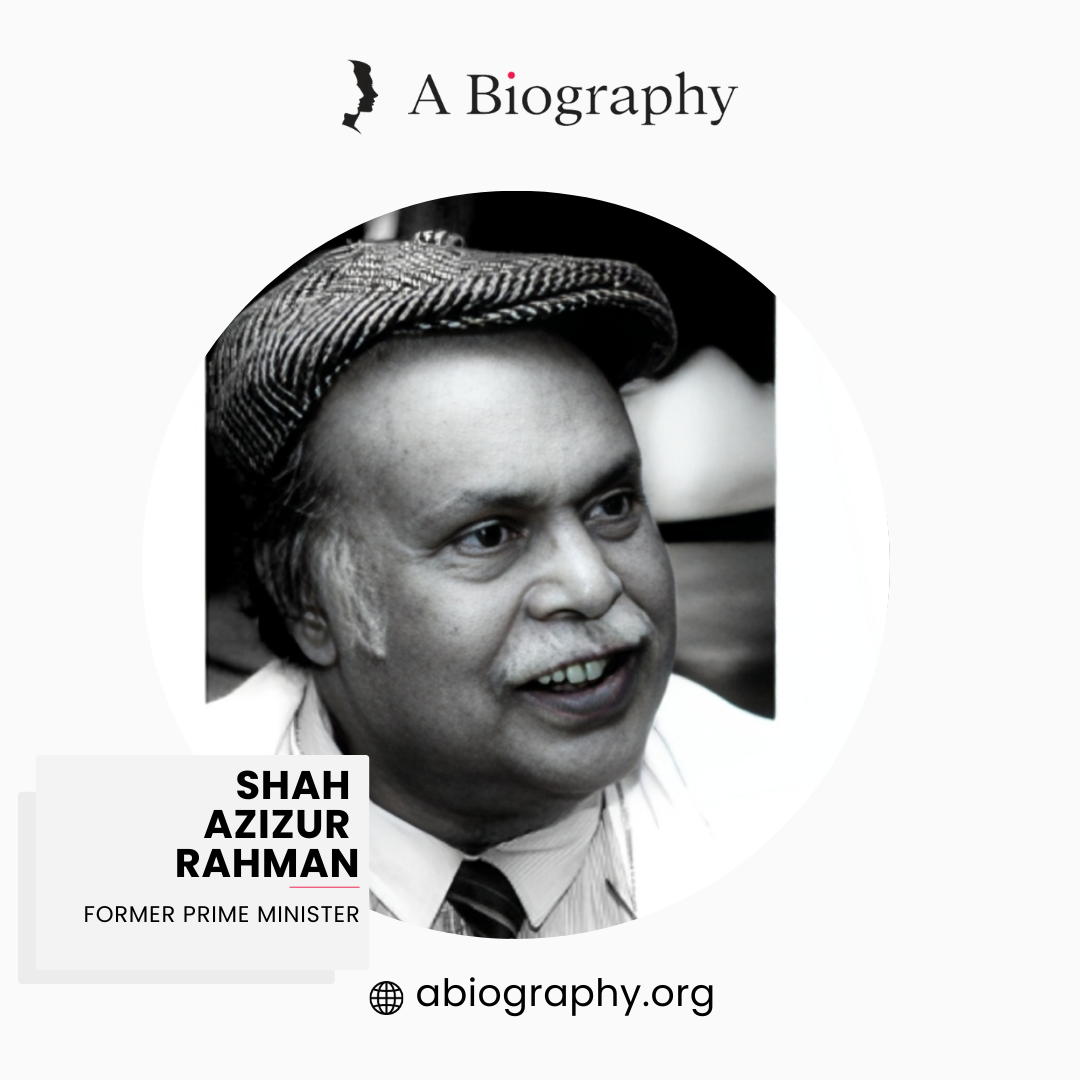BIOGRAPHY OF SHAH AZIZUR RAHMAN
Former Prime Minister
(1925 –1989)
Table of Contents
ToggleIntroduction
Shah Azizur Rahman, a notable figure who served as the former Prime Minister of Bangladesh from 15 April 1979 till 24 March 1982. He held a position of great importance and responsibility in leading the government and making decisions for the nation.
During his time in office, he worked diligently to address various issues and challenges faced by the country. Azizur Rahman played a significant role in shaping the policies and strategies to improve people’s lives and the country’s development.
Life Of “Shah Azizur Rahman” At A Glance
Known For: Former Prime Minister
Born: 23 November 1925
Age: 63
Birthplace: Daulatpur Upazila, Kushtia, Bangladesh
Nationality: Bangladeshi
Education:
BA in English language and literature, Calcutta University
BL, Dhaka University.
Occupation:
Minister of Labor and Industry
Prime Minister
Death: 1 September 1989
Early Life
On 23 November 1925, Shah Azizur Rahman was born in Daulatpur Upazila, Kushtia, Bangladesh.
Education and Career
Shah Azizur Rahman obtained his Bachelor of Arts degree in English language and literature from Calcutta University. He also received a BL degree from Dhaka University.
From 1945 to 1947, he held the position of general secretary in the All Bengal Muslim Student League. As a student political leader, Rahman actively participated in the Bengal Provincial Muslim League and played a role in the Pakistan movement.
Following the partition of India, he served as the joint secretary of the East Pakistan Muslim League. However, he opposed the Bengali Language movement of 1952. Rahman continued to engage in Bengali and national politics in Pakistan, becoming a vocal critic of Bengali leader Sheikh Mujibur Rahman and his Awami League, which advocated for increased autonomy for East Pakistan.
Rahman was the leader of the East Pakistan Muslim League from 1952 to 1958. In 1962, he took part in the Pakistan National Assembly elections in Kushtia but did not win. He joined the National Democratic Front in 1962.
In March 1964, he joined the Awami League and became the vice president of the Pakistan Awami League. In 1965, he was elected to the National Assembly and served as the deputy leader of the opposition until 1969. He was also one of the defense lawyers in the Agartala conspiracy case.
During the Bangladesh Liberation War, Rahman supported the Pakistani state forces and criticized the Bengali nationalist movement. He led the Pakistani delegation to the United Nations in November 1971 and denied that Operation Searchlight was genocide.
After Pakistan’s defeat in the war, Rahman was arrested but later released in 1973. In the post-war period, it was estimated that over a million people had been killed in Bangladesh by Pakistani forces. Rahman continued to persuade Muslim countries in the Middle East not to recognize Bangladesh diplomatically.
After Sheikh Mujib’s assassination, Rahman joined the reestablished Muslim League in Bangladesh in 1976. He then became a member of the newly formed Bangladesh Nationalist Party under President Ziaur Rahman in 1978 and served as the Minister of Labor and Industry.
When Ziaur Rahman became President, he initially planned to appoint someone else as prime minister, but after that person’s unexpected death, Shah Azizur Rahman was chosen instead. It is believed that Ziaur Rahman preferred other candidates for the position, but Shah Azizur Rahman won the support of the party’s parliamentarians through a secret ballot.
As prime minister, Shah Azizur Rahman helped ratify the controversial Indemnity Act and worked with Zia to establish the Bangladesh Nationalist Party, which won the 1979 parliamentary elections. After Ziaur Rahman’s assassination in 1981, Shah Azizur Rahman continued to serve as prime minister. However, both he and President Abdus Sattar were overthrown in a military coup led by army chief Hossain Mohammad Ershad in 1982.
In June 1985, a split occurred in the BNP. Shah Azizur Rahman became the leader of one faction as chairman. However, he later decided to support General Hussein Mohammad Ershad’s political program and joined his National Front on 17 August 1985. Although, he didn’t stay with the Front for long and left after a few months. In August 1989, Shah Azizur Rahman rejoined the main BNP party led by Begum Khaleda Zia.
Personal Life
Shah Azizur Rahman was famous for his criticizes and speaks in a severe way. Moreover, he had a good command of Bangla, English, Urdu, Persian, and Arabic. He was a capable member of parliament.
Death
Rahman passed away in Dhaka on September 1, 1989. He was 63 years old.
Conclusion
Shah Azizur Rahman was a remarkable person and a respected politician. His contribution to the nation reflects his dedication to his position. Though he was against the nation’s independence later he supported and worked hard for the nation..
Disclaimer
All content on this website is provided in good faith and only for general information purposes. A Biography makes no guarantees regarding the information’s completeness, reliability, or correctness. Any action you take as a result of the material on this website is entirely at your own risk. A Biography is not responsible for any losses or damages incurred as a result of using our website.
এই ওয়েবসাইটের সমস্ত বিষয়বস্তু সরল বিশ্বাসে এবং শুধুমাত্র সাধারণ তথ্যের উদ্দেশ্যে প্রদান করা হয়েছে। একটি জীবনী তথ্যের সম্পূর্ণতা, নির্ভরযোগ্যতা বা সঠিকতা সম্পর্কে কোন গ্যারান্টি দেয় না। এই ওয়েবসাইটের উপাদানের ফলস্বরূপ আপনি যে কোনও পদক্ষেপ গ্রহণ করেন তা সম্পূর্ণরূপে আপনার নিজের ঝুঁকিতে। একটি জীবনী আমাদের ওয়েবসাইট ব্যবহার করার ফলে কোনো ক্ষতি বা ক্ষতির জন্য দায়ী নয়।

